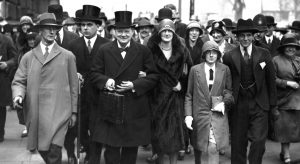
Reference
A Mantra Not a Book

May 14, 2009
Warren F. Kimball
Professor Kimball, Treat Professor of History at Rutgers University, has written extensively on Roosevelt and Churchill and is editor of three volumes of their correspondence.
 Human Smoke: The Beginnings of World War II, the End of Civilization, by Nicholson Baker. Simon & Schuster, 576 pp, $25.
Human Smoke: The Beginnings of World War II, the End of Civilization, by Nicholson Baker. Simon & Schuster, 576 pp, $25.
OK. I have forced myself to sit down and write a review of the non-book. What is it? Why is it so difficult to review? I finally realized that it is not possible critically to review a mantra: an unthinking chant, like prayer wheels, rosaries and worry beads. Monotonous repetition may be an effective appeal, but it is an appeal to emotion, not reason. It is not history.

2024 International Churchill Conference
History has some simple demands: a marshaling of evidence; an honest analysis of cause and effect; a story based on that evidence. Baker’s non-book offers, at best, disjointed fragments of the truth. (Please, no existentialist arguments about “what is truth?” I am happy to go on about historical truth as an artistic conclusion based upon the best evidence, but this is not the place.) In the words of my 18 year-old grandson, the fragments “read like beat poet Allen Ginsberg writing history for USA Today, only without the goofy graphics.”
It is impossible to summarize the non-book’s story. There is none. But the themes are repetitively evident: war is bad, regardless of the causes; bombing civilians is evil, regardless of the circumstances; anti-Semitism is unacceptable, particularly as practiced by Churchill and the Roosevelts; comments by Goebbels (and other assorted Nazis, including Hitler) on the character of Churchill and Roosevelt are legitimate and perceptive.
This is childish (as opposed to childlike) reasoning that throws up pie-in-the-sky idealism without the slightest genuflection toward practicality, unintended consequences, or common sense: a self-righteous primal scream against physical evil (bombing civilians) that blames just the bombers (FDR and Churchill). No bombing—absolutely none—would have happened except for Hitler and the Nazis, so let us keep our focus where it belongs, on first causes. Never, ever, does Baker examine the unintended consequences of not fighting Hitler. As a literary exercise, it’s interesting if jejune. As history, it’s awful.
Baker should be ashamed of himself for pretending to write history, although pious believers never worry about such things. Simon & Schuster should be ashamed of themselves for perpetrating a fraud on the public, but profit absolves all sins. Perhaps most shameful of all is the reviewer for the Los Angeles Times (I omit his name since notoriety must be what he sought) who blandly and blindly asserted that Human Smoke “is a meticulously researched and well-constructed book demonstrating that World War II was one of the biggest, most carefully plotted lies in modern history.”
Google the non-book and you will find a long list of reviews that compare Baker’s fragments—an appalling number so out of context and/or incorrect as to constitute real lies—to the facts. The striking examples provided by Andrew Roberts in his own review leave Baker hoist on his own petard, and I leave much of the hand-to-hand combat to him.
It’s always open season on leaders like Churchill and Roosevelt, people who made tough decisions—because they sell books, even non-books. Yes, they sanctioned ugly and sometimes unsuccessful actions in the course of the war. And yes, each war seems to expand the boundaries of inhumanity. FDR failed to do as much as he might have to rescue the victims of Nazism, even though what was possible was pitifully little, symbolic more than practical, though symbols should have mattered for a believer in the American Declaration of Independence and the Preamble to the U.S. Constitution. Churchill did not need callously to call for punishing civilians in Germany, though history knows that Hitler’s appalling popularity depended on his appeal to civilians. We know from wartime intelligence that targeting civilians did not break German morale during World War II, nor did it stop Hitler from launching similar attacks. The Blitz eventually gave way to V-2 rockets. There is little if any evidence that Allied embargoes on food contributed to their victory in Europe. But those are Baker’s epigrammatic targets.
The following juxtaposition of fragments offers a striking example of Baker’s intellectual silliness. He offers a quote from Gandhi (112): “without the German people, he [Hitler] was nothing and the German people would in the end be touched by nonviolence” (Pacifists are, for Baker, invariably perceptive.) That is quickly followed by a comment on Hitler from FDR: “We would call him a nut. But there isn’t any use calling him a nut because he is a power and we have to recognize that” (114-15). “Hence the need for thousands of airplanes,” adds Baker portentously. Huh?
There are quotes in the non-book that challenge the self-justificatory excuse-making by Churchill, Roosevelt, the UK, and the USA. But they are ripped so far out of context that the woof and warp of history is undetectable. Worse, Baker’s major players are consistently and overwhelmingly without ideals—except for Adolf Hitler. Baker’s minor players—Gandhi, the Quakers, victims—can think no wrong. Where, one wonders, is the banality of evil? What happened to “the search for AH?”
There have been powerful attacks on the brutality of war since recorded history. Even the Second World War—“the good war”—generated memorable protests. For me, two motion pictures come to mind: “Saving Private Ryan” combined a scream of anger at the (probably unnecessary) slaughter on Omaha Beach with a story of bureaucratic bungling; and “The Americanization of Emily,” with James Garner’s tirade against the cynical glorification of war with medals and honors—again, the target was Omaha Beach debacle.
Those were honest attacks on the futility and horror of war that used history legitimately. Baker’s baloney is dishonest—making it not only ineffective, but insulting. Reading the non-book, one has the sense that Baker accounts for nearly every bomb dropped on Germany. Yet the London Blitz is barely mentioned, and then together with a satisfied (or sarcastic?) comment by one Londoner: “After all, our chaps are doing this every night to the Germans” (227).
One can make a good case that bombing civilian targets is ineffective. “Shock and Awe” may have worked against Saddam Hussein’s military, but subsequent events demonstrate that it failed to subdue civilians. The London Blitz, and the even more destructive indiscriminate pounding of Malta only stiffened morale. The atomic bomb may have prompted Japan to surrender sooner, but how far away was Japan’s surrender without it? The 9/11 atrocity angered and united Americans—hardly bin Laden’s goal. But distorted faux-history is not the way to make that case.
The sarcastic slur on pacifists is that by refusing to fight they condemn the very people who fight for their freedom. But such freedom brings with it the responsibility to be honest with the evidence, whatever one’s convictions. Baker has shirked that duty.
Subscribe
WANT MORE?
Get the Churchill Bulletin delivered to your inbox once a month.




